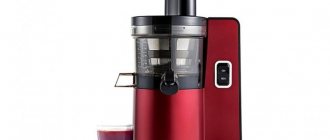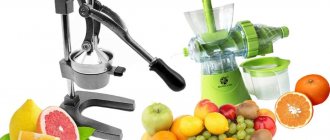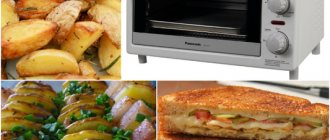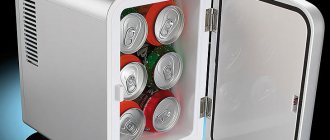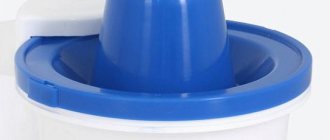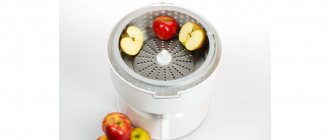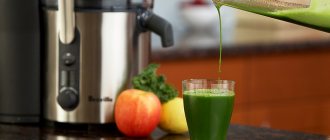Tatyana Khan Switched to a healthy lifestyle
Recently, I switched to a healthy lifestyle and decided to start every morning with a glass of fresh juice. But preparing a fortified drink on a large unit is very inconvenient. Therefore, I decided to take a closer look at compact models for a glass of juice.
But with so many options, choosing the most suitable juicer is not easy. I decided to figure out what to buy: I read forums, visited manufacturers’ websites, and watched videos on YouTube. I share the information I found with you.
Things to remember
- Types of mini juicers: for citrus fruits; screw; centrifugal; combined.
- The main factors when choosing: the diameter of the chute for loading fruit; motor power; bowl volume.
- Budget models : Polaris PEA 0205; Polaris PEA 0934A; Philips HR 2744/40.
- Mid-price models: Moulinex JU 2100; Braun MP80 Multipress automatic.
- High-priced models: Panasonic MJ-L 500STQ; Kenwood JE 680.
- Advantages of the mini device: optimal dosage; quick cooking; less space occupied; easy maintenance; mobility; affordable price; direct feed system.
Advantages of small juicers
A juicer is a device for producing juice from fruits, berries, and vegetables. The principle of operation is a mechanical effect on the products placed in it. The device is intended for use in domestic and industrial conditions, in public catering establishments.
Reference . The prototype of the juicer was created in ancient times. However, it was only in 1948 that the devices were equipped with a centrifuge. In 1955, under the leadership of the Swiss Pfluger, work began on their improvement.
The modern market offers a wide range of juicers to suit every taste and budget. But the most popular among consumers are small household juicers.
They have a number of undeniable advantages:
- Compactness. The device is small in size, weighs little and is considered the best option for small kitchens.
- Easy to use, care and store.
- Economical. Small models consume less electricity compared to classic appliances.
- Speed of work. A glass of juice takes just a few seconds to prepare.
- High-quality spin, not inferior to larger devices.
- Versatility. Juicers can make purees, smoothies, and cocktails.
- Reliability and long service life.
- Low cost when compared with large models.
Thanks to its small dimensions, the device is convenient to take with you on trips or business trips.
Conclusions on the topic
We have introduced you to the main guidelines that you should consider when choosing a juicer. We presented the best models, the quality of work and reliability of which have been tested in practice. The information we offer will help you decide on the best option.
Given the numerous advantages, we recommend choosing an auger juicer. It is quieter, more delicate in terms of processing raw materials, and less “gluttonous” in terms of electricity consumption. But the centrifugal device will prepare fresh juice faster, although it will wake up the whole house early in the morning.
Would you like to share your own arguments that guided you in choosing a device for making a drink from fresh vegetables/greens/fruits? Tell us about which device you chose. Leave comments in the block below, ask questions and post photos there.
Criteria for choosing mini juicers
Choosing a juicer is a difficult task, since the modern market is replete with various models that differ from each other in design, control, design, dimensions, and purpose.
When choosing compact juicers, pay attention to a number of basic criteria:
- diameter of holes for loading products;
- power;
- bowl volume.
Diameter of holes for loading products
The indicator does not affect price and performance, but experts recommend choosing models with a large opening for loading products.
Reference . The average diameter of the loading hole in modern models is 3.5-9 cm.
The larger the neck, the less time you will have to spend preparing products for loading into the machine. The convenience of a large hole will be especially appreciated by lovers of juice from apples, tomatoes, carrots, and beets.
Power
Power is the most important indicator. It is he who will help you understand which juicer to choose for 1 glass of juice. The period of continuous operation and the purity of the resulting juice depend on this parameter. After all, the higher the speed of the device, the more pulp gets into the juice. If the speed is low, it turns out cleaner and more transparent, but more waste is generated.
Average power of different juicer models:
- for citrus fruits - up to 100 W;
- screw - 200-500 W;
- centrifugal - 500-2000 W.
Choose a device depending on which drink you like best: thick with pulp or lighter.
Advantages and disadvantages
As with any technology, these devices have both advantages and disadvantages. To determine which device is better, let's look at them.
Juice cookers
Pros:
- high performance,
- easy preservation,
- light juice,
- multifunction device,
- ease of care,
- no noise.
A steam juicer can be quite large and hold up to 20 liters of finished drink. That is, it can process a large number of fruits at a time. This is a significant plus if you need to process a lot of products.
One of the main advantages of this device is the ease of conservation. The juice obtained in such a device can be immediately poured into jars and closed. This processing method does not require additional cooking.
The juices are sweet, so you don’t need to add granulated sugar to them. In other methods of canning, sugar is added to drinks to prevent them from spoiling. Many people prefer clear nectar to rich, pulpy juice. In the juicer it turns out light and clean.
The design of the device is extremely simple - three pans are placed one on top of the other. As a result, the device is very easy to disassemble and wash. In addition, the juice extractor does not make any noise during operation.
This is important if there are children in the house
The finished drink can be stored in the refrigerator for up to 7 days. During this time, it will not lose its valuable qualities.
The disadvantages of these devices include the rather long juice preparation time and the large size of the device. Not every kitchen has room to accommodate three impressive-looking pots.
Juicers
Advantages:
- high speed of preparing drinks,
- good performance,
- screw models have high functionality,
- compactness of devices.
Powerful juicers allow you to squeeze juice from various types of fruits in a matter of minutes. There are household appliances designed to process a large number of products. Some centrifugal devices can process up to 100 kg per hour, producing tens of liters of drink.
If equipped, auger-type devices can be used to prepare not only juices, but also purees, jams, pasta, minced meat, etc. They successfully cope even with herbs and nuts, squeezing the liquid out of these products. Such juicers produce a healthy and thick drink of high concentration. It contains a maximum of vitamins and valuable substances.
In general, juicers are quite compact. They can be easily stored in any kitchen cabinet. Even those devices that are designed to produce large quantities of juice have rather modest dimensions.
Cons of juicers:
- centrifugal devices can produce quite a lot of noise and vibrate during operation;
- When canning drinks, they will need to be boiled before pouring into jars. It takes a lot of time and energy. This process will require additional utensils;
- Many models require cleaning the filter after using the device. Some of them are difficult to disassemble and assemble;
- freshly squeezed juice should be drunk immediately or canned; it cannot be stored;
- multifunctional screw devices can have a fairly high price.
Based on these features of the devices, you can figure out which one is preferable for you. It can be noted that a juice cooker is definitely more suitable for canning purposes.
Types of small juicers
There are dozens of juicer models that combine useful functions, convenient design and attractive design.
Juicers differ in their operating principle and purpose:
- for citrus fruits;
- screw;
- centrifugal.
Let's take a closer look at each of the presented devices, find out the features of their operation and determine the models.
For citrus fruits
A citrus juicer is a highly specialized technique for processing oranges, tangerines, lemons, and grapefruits.
A small juicer consists of a conical nozzle with a ribbed surface and a container for collecting juice. To get the drink, just cut the fruit in half, place each half in turn with the pulp on the cone and scroll. The resulting juice flows through the holes into the container.
Reference . Some models are additionally equipped with filters that retain seeds and films during spinning.
Similar devices are:
- manual;
- electric ones with low power - due to the softness of the citrus core and flexibility for processing.
The table shows several models of devices for citrus fruits with a description of their characteristics:
| Model | Characteristics | pros | Minuses |
| Braun MPZ9 |
|
| There is only one attachment included. No speed selection. |
| Moulinex M6000302 |
|
| Spinning is slow and requires effort. |
Screw
The screw model is a universal device for obtaining juice from fruits, vegetables, berries, various greens, grains, and nuts. Outwardly it resembles a regular meat grinder.
The device is equipped with a screw - a special cylinder with spiral ribs. Depending on the model, the device can be equipped with one or two screws with multidirectional rotation, located either vertically or horizontally.
The operating principle of an auger juicer is based on pressing and crushing products with an auger. After this, the resulting pulp is pushed to a sieve, where it is squeezed almost dry.
Reference . Auger machines operate slower than other models, but this does not reduce their performance.
The table shows popular models of auger juicers and their main characteristics:
| Model | Characteristics | pros | Minuses |
| Moulinex ZU 5008 |
|
|
|
| Philips HR 1897 |
|
| The neck for loading products is a bit narrow. |
| Omega TWN30R Twin Gear Red |
| High quality spin. The cake is absolutely dry. There is an automatic pulp collection function. Availability of additional attachments:
| Narrow neck for loading products. |
| Meileyi MLY-662 Red |
|
| Slow work. |
Centrifugal
A centrifugal (rotary) juicer is a device designed to obtain juice from fruits, berries, and vegetables. The principle of operation is to grind food on a grater while rotating the centrifuge at high speed. Next, the mass enters a separator (conical or cylindrical), in which the juice is separated from the pulp.
Reference . Models with a conical separator extract up to 70% of the liquid from the products; a separate container is provided for the cake. Devices with a cylindrical separator extract up to 95% of the juice, but there is no separate container for the pulp (it accumulates inside the device).
The table lists the models of centrifugal juicers and a brief description of each:
| Model | Characteristics | pros | Minuses |
| Zelmer 377 |
|
|
|
| Polaris PEA 0205 |
|
| There is no separate container for waste, and only 0.25 liters of waste can accumulate inside. |
